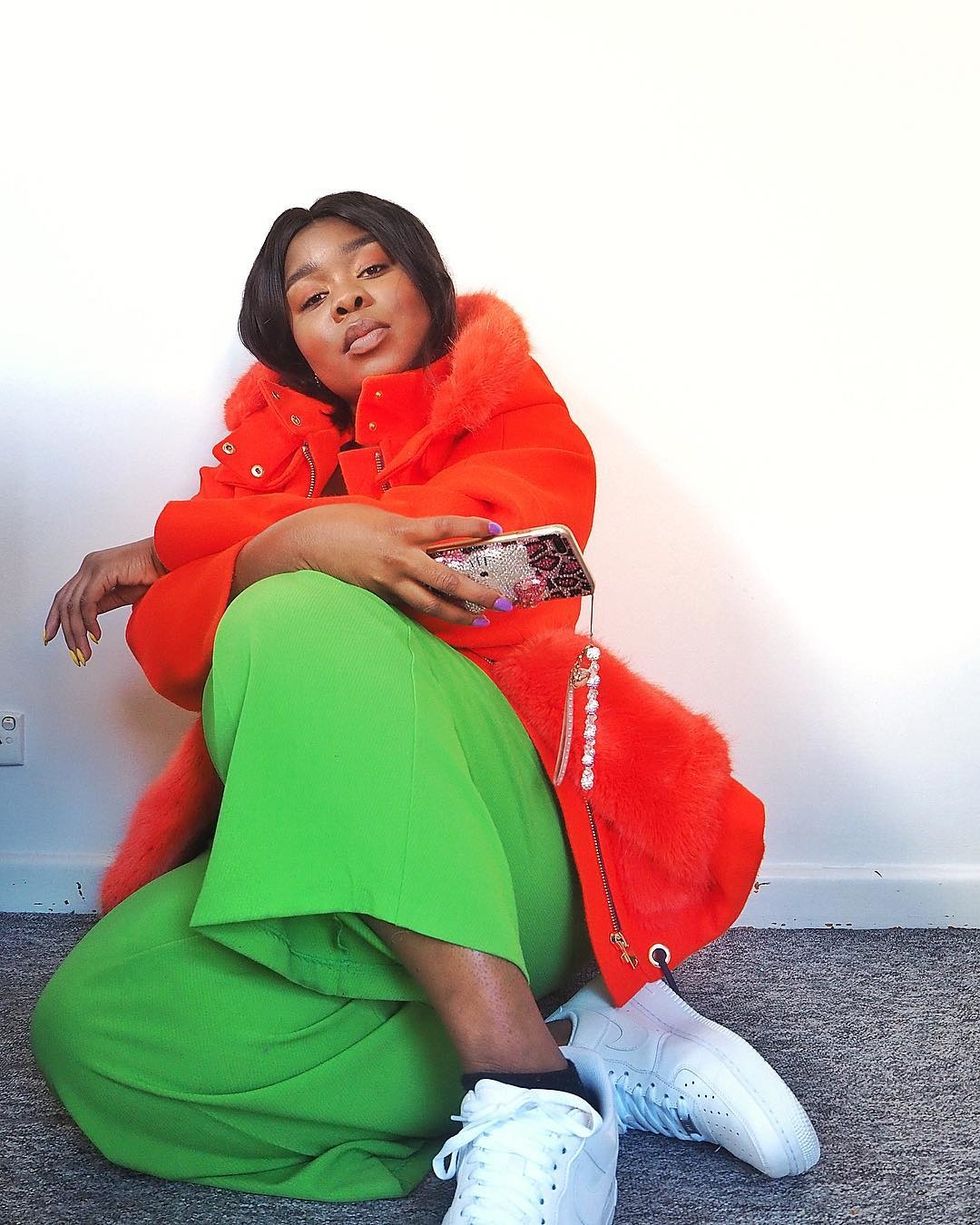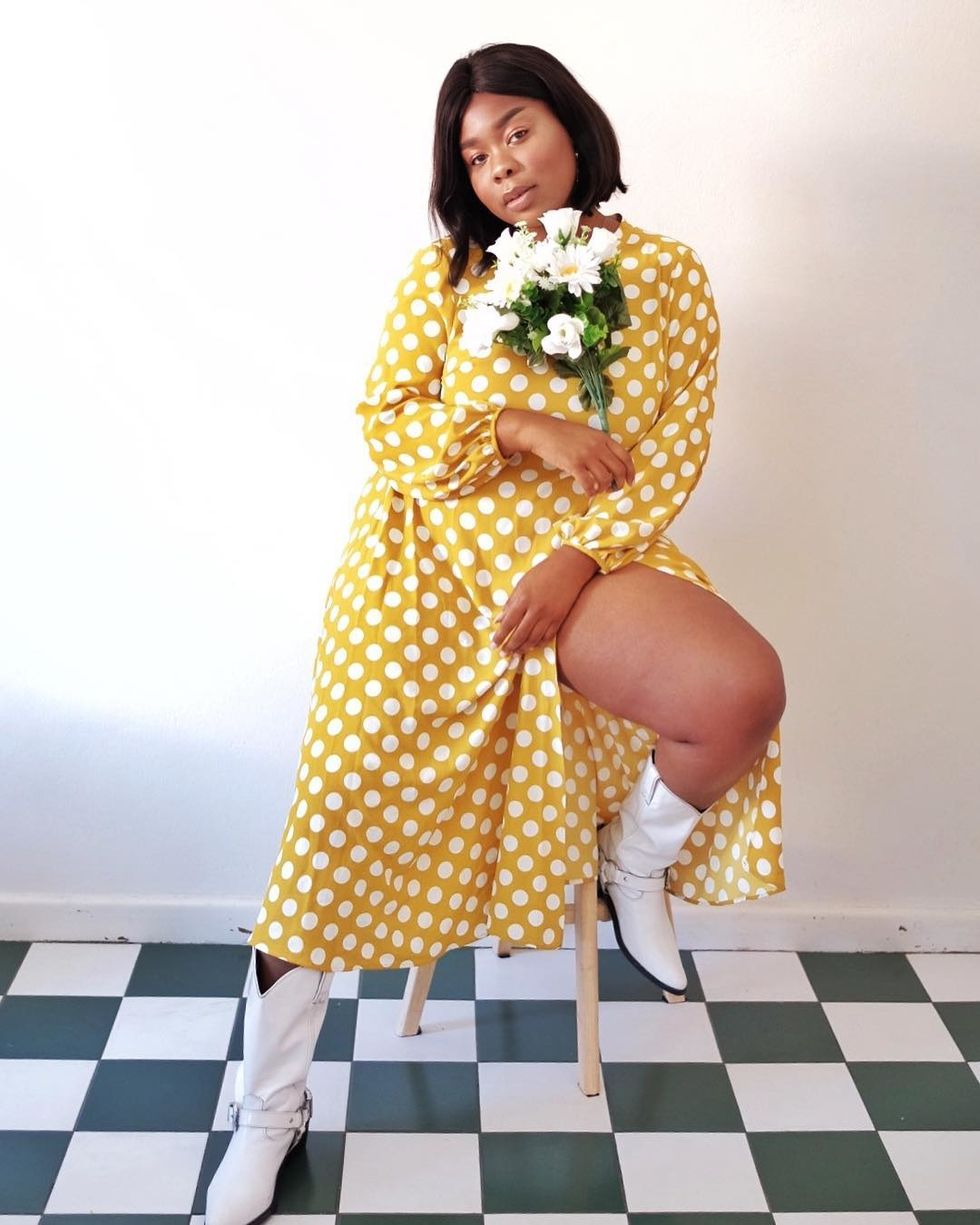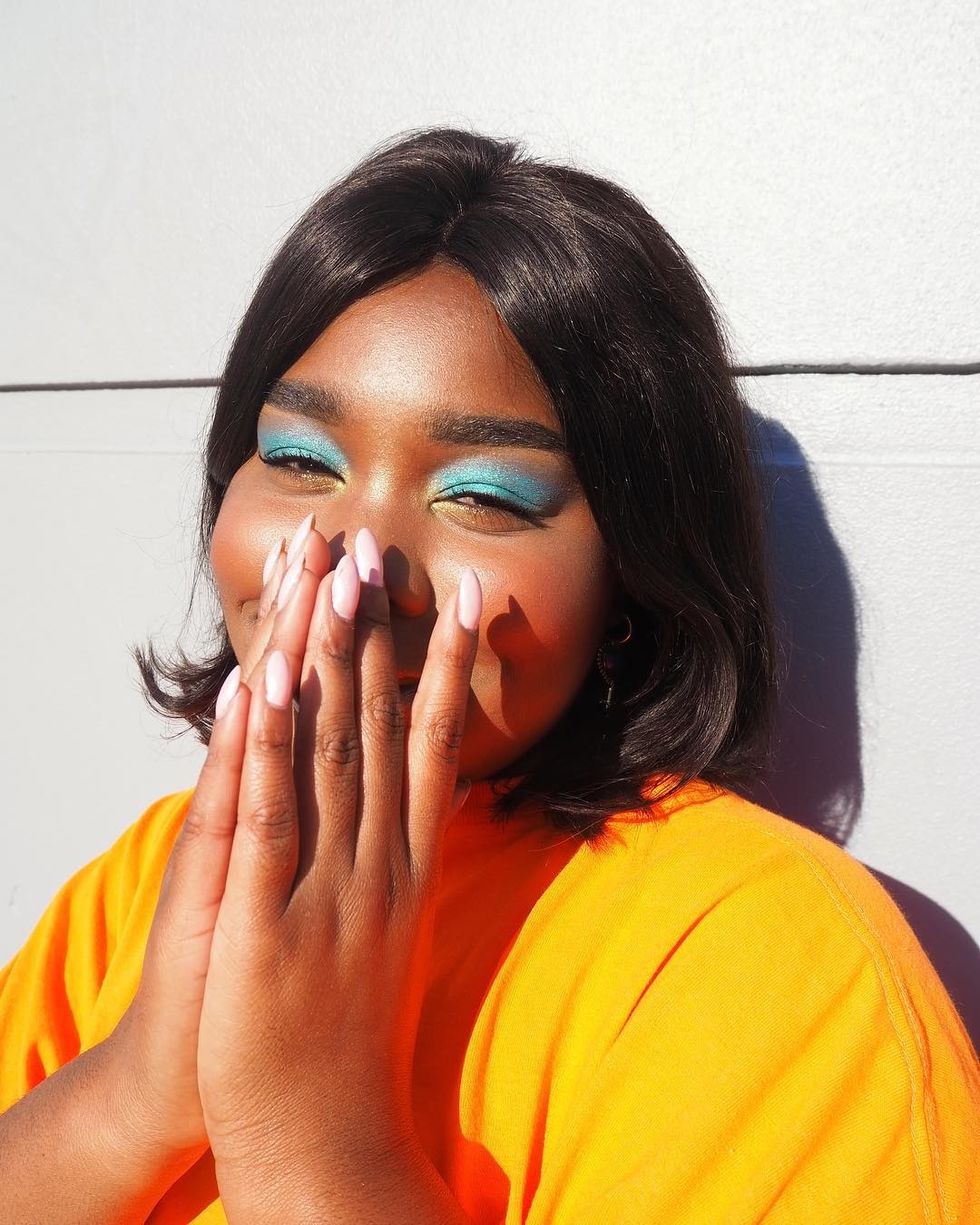This Ghanaian-Australian Music, Fashion and Beauty Influencer is the Refreshing New Face of Australian Youth Culture
We talk to FlexMami about bringing intersectionality mainstream, growing up in Australia, and on not being a spokesperson for all black people.

Lillian Ahenkan aka FlexMamirefers to herself as "your favourite slashie." Born in Australia to parents who emigrated from Ghana, FlexMami describes herself as "the ultimate multidisciplinary millennial in media." She started off commanding rooms as a DJ, before swiftly transitioning into TV presenting, radio hosting, starting her own YouTube Channel and writing.
Her fresh, eclectic sense of style laced with her messages of positivity, juxtaposed with "real speak" online, have caught the attention of big-name beauty and fashion brands whom she works for as a fashion influencer. FlexMami is undeniably a fundamental part of Australia's youth urban culture, an integral part of increasing the screen visibility of diverse citizenry. She's a force encouraging dialogue in a country whose media industry still falls far short of mirroring the changing national demographic landscape.
I caught up with FlexMami via phone when she was in Los Angeles. We talked media, fashion and, of course, beauty. But we also delved deeper into topics about race, identity politics and self-accountability. Her energy was upbeat but pensive as she responded to my questions, while getting ready to do the tourist rounds for the day.

This interview was edited for length and clarity.
What inspired the name FlexMami?
FlexMami was actually gifted to me by a friend. He would always say that I flex because I'm a DJ but at the same time I have a very maternal energy. One day we were having a nondescript conversation which spurred into other conversations and the name just came to him. I don't think he intended for me to use it but, I needed a new Instagram name, used FlexMami and it stuck.
You were born and raised in Sydney Australia to parents who emigrated from Ghana. What was this experience like?
My experience growing up in the eastern suburbs of Sydney was pretty chill. I went to a public school with a nice smorgasbord of cultures and ethnicities. In this circle, I didn't really feel that I was the odd one out. I always have, and still do, identify as being Australian. A lot of the Ghanaian cultural aspects were learnt from the outside and when I'd go on trips to Ghana.
In hindsight, I feel that there was definitely a lot of learned internalised racism and disdain for culture because it was the only thing that separated me from my peers when it came to connecting. This happened when I started to get into spaces where I was being perceived as the 'black girl'. I would go above and beyond to prove that I wasn't, that I was Australian, saying things like, 'my mum moved here 30 years ago, I don't even speak another language—I love vegemite'. These were things I would say to go above and beyond to prove that I was Australian as an alternative to being ostracised for reasons that I wasn't really ready to deal with back then.
I had never experienced racism in its purest form but I'd heard about it from family and friends living in the Western suburbs of Sydney who expressed, that me living in the city's east, gave me a certain kind of privilege which was starting to rub off on me. Going above and beyond was a way to prepare myself for my own fears of being seen as 'different', as being African because 'that would be crazy.' It was a way of dodging the fear of the unknown.
You describe yourself as the ultimate multi-disciplinary millennial in media, starting off as a DJ before your career morphed into TV presenting, radio hosting, writing and starting your own YouTube channel. Can you tell us about this journey?
I've always thought that I had an important voice and that's because my mother over-enthused that I was special, that I was important and my perspective was valid. Growing up I felt the need to understand my circumstances, and my surroundings and take control of that narrative. This manifested into wanting to amplify my voice on greater scales. I initially thought it would be in the fashion industry, then it transitioned into PR which kind of fulfilled that need to speak, be heard and share my message, irregardless of what I was saying. I knew that I had a perspective I wanted to share.
When I became a DJ, it wasn't just about the music for me but having access to a lifestyle that I wanted. When I self-reflect, I realise I have a preoccupation with fitting in and being different. Being in the music industry was a way of exercising that, being one of the many, but knowing I would never just want to be confused as just being one of. Being a DJ gave me access, it gave my voice value – people wanted to listen and learn. Because music isn't my end all be all, I thought "how can I transition into speaking and being heard for a living". This led to TV presenting, where my job would be to speak, my voice would be heard and amplified without the consent of everybody else and other opportunities evolved from there.

Your eclectic look and self- presentation have amassed tens of thousands of followers online. What and who inspires your fashion and beauty choices?
In some way I'm always constructing a narrative of some sort, so the primary motivation for my way of dress is about what I like and the secondary motivation for that, is always wanting to appear as 'one of' but definitely not 'one of'. It's finding people who tee to that line, someone like Solange for instance—you're highly aware that she's one of the fashion and music community but there's something about her that's intangible that separates her from the rest, one step above or one step in front.
You've become part of mainstream Australian millennial culture. Your online presence as a beauty and fashion influencer, on top of your positive pop culture commentary, has caught the attention of both big-name Australian and international fashion and make up brands. What has your experience as a person of colour been in a society where mainstream pop icons still largely reflect a certain idea of beauty?
It's like acknowledging that you have a seat at the table and then not being too flattered by that and understanding the reason why you have a seat at the table. It's been a reminder that although I have been given certain privileges, like having access to come hang, and be amplified. I'm style XYZ brand's quota of diversity or quota of inclusivity. It's a reminder that even though people want you to fit in, the world isn't made for you.
For example, in makeup, every brand and their sister brand will harp on the fact that they have a foundation for you. So, you should be really excited and grateful and promote this brand accordingly. But then they don't have the concealer, the lipstick, powder, the blush for you—or the brow products for you either. So, it's that constant battle of understanding and appreciating that you've been acknowledged and amplified but also not perpetuating the issues of the industry and becoming complicit because I have access.
For instance, when I worked for "unnamed brand," I got my foundation sent to me in two shades of darker colours in a nice beautifully wrapped PR package but was told that darker colours beyond a certain number are only available for purchase online because Australian retailers generally don't stock these darker colours. What am I meant to tell my audience? That you have to work twice as hard to get half the payback but yes, you do get a foundation!
I acknowledge that I'm in a position to influence but the beauty industry is still so warped and backward in so many ways, that sometimes the mouth pieces or faces of these brands don't have any influence.

Your website states that you're passionate about bringing conversations regarding identity and intersectionality to mainstream environments. What's been your experience inserting these themes into mainstream environments? Do you feel that you've in any impacted the dialogue surrounding these issues and do you tap into your experiences of having an African background?
I realised quickly that I couldn't use the platforms that were given to me to share this message because they would be diluted to the point that they were without merit. You'd assume that working at major outlets, doing the news, writing scripts would give me the agency to express what I would see fit but the messages get diluted.
Initially, I thought it would be a nice entry-level way to integrate discussions of accountability identity, race, code-switching, etc but when you have to take this message and seed it through a corporation who doesn't want to piss off labels and doesn't want to appear too left leaning or start an argument they can't finish, it's tough. I once used the term cultural appropriation when covering a story on Justin Timberlake and was asked to change it because people would find it too confronting.
I'm reminded that I can't use these corporations or broad platforms to share my message. For me, it's about constantly integrating my experience in what I do day to day. It's my responsibility to explain to people that it's not what it seems just because I have a seat the table, it comes with restrictions and guidelines.
"I've always thought that I had an important voice and that's because my mother over-enthused that I was special, that I was important and my perspective was valid."
I get randomly contacted by media outlets asking for my opinion about various things happening in the hip hop world, such as Kanye West's recent behaviour and Kendrick Lamar winning the Pulitzer Prize. I often really don't have an opinion about these things and don't want to be considered a spokesperson on these issues. It's not in my benefit to be one of the 5 black faces amplified in Australia. I'm not the amalgamated experience of every black person and the longer I'm left to be represented as that, the worse it is for everyone else.
Your Youtube channel contains videos where you share your personal insights and give advice on an array of topics including, how to wear synthetic wigs and make them look real, as well as the real reasons why people can't achieve their goals. How do you choose the topics you address through this online platform?
It's an outlet to discuss things that I was thinking and feeling in the past but too afraid to discuss for fear of offending people. Now, If I'm thinking of something, I sit with my thoughts and spend the time to really analyse them before I share it, because I think so much of the internet is famed connection. I feel like the internet is vomiting out information, everybody's talking but often not saying things of much worth. For me it's about encouraging more of the dialogue and critical thinking that I want to see, my personal accountability, spreading positive messages and not letting other people control my narrative for me.

FlexMami is a personal brand that you've built from the ground up. What was your initial goal when you first started it and how do you envision it evolving over time?
My initial goal, after I realised I could build a brand was honestly, just to get paid to be myself, which sounds silly but the amount of people who foolishly don't see their value and how it should be appreciated is frustrating to me. I started off thinking that I wanted to get paid for my message which isn't necessarily the best way to go about it.
Now I want the DJing, the fashion and the beauty to be secondary to my message and any message that I want to share. I want to be renowned for my intellect and my opinion not necessarily the aesthetic distraction.
What does that look like in 2025? I don't really know but I'm willing to see and to try. I just know, I want to be seen for the Flex that I am and not the Flex that I've been presenting as.

